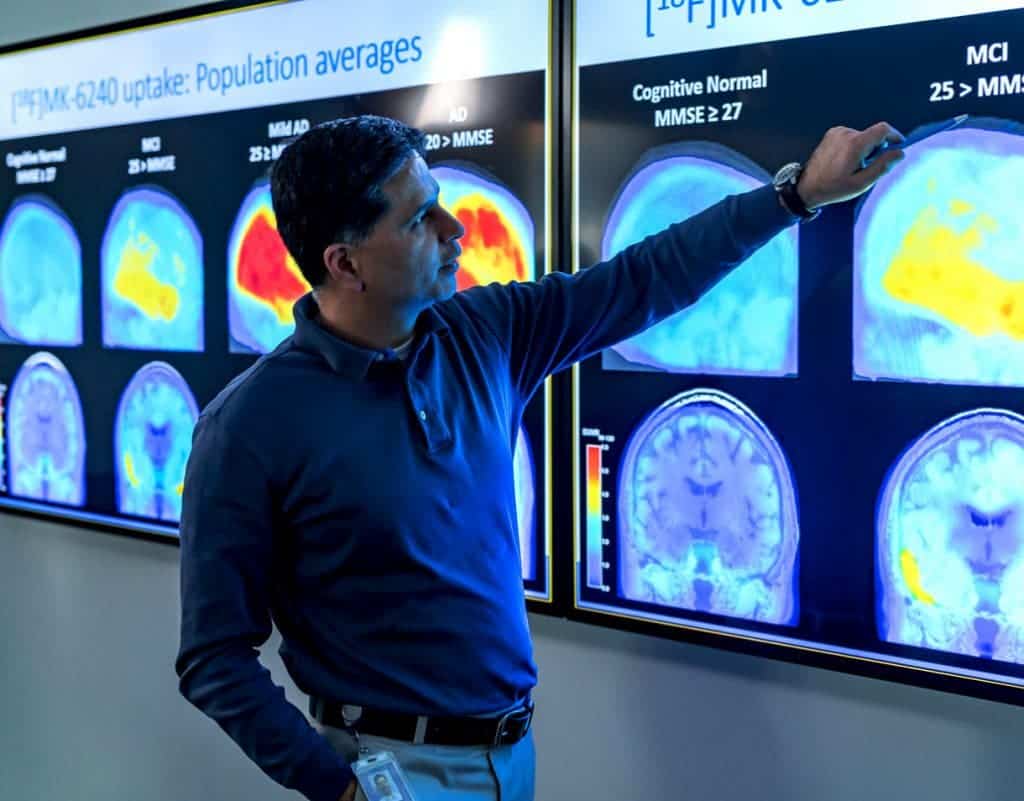“This is the first time we have any new approved treatment for Alzheimer’s disease over the past two decades,” said Dr. Babak Tousi, who led Cleveland Clinic’s study site for the multicenter clinical trials. But critics say the evidence for benefits is scant, while the potential side effects are troublesome — and the FDA itself has not granted the drug full approval.

The story of aducanumab (sold under the brand name Aduhelm), the drug developed by Biogen, is riddled with controversy. The first-of-its-kind treatment targets the underlying cause of Alzheimer’s, rather than just its symptoms. It functions as an antibody that targets amyloid, a protein that forms abnormal clumps in the brains of people suffering from Alzheimer’s — clumps that can trigger disruption and destruction in sufferer’s brain cells.
Aduhelm is able to reduce the level of amyloid in the brain and slow down cognitive decline in patients, especially in the earlier stages of the disease, and in conjunction with healthy lifestyle modifications. It’s far from perfect, but it’s still a big leap compared to where we were just 10 years ago.
“Alzheimer’s disease is a devastating illness that can have a profound impact on the lives of people diagnosed with the disease as well as their loved ones,” said Patrizia Cavazzoni, M.D., director of the FDA’s Center for Drug Evaluation and Research. “Currently available therapies only treat symptoms of the disease; this treatment option is the first therapy to target and affect the underlying disease process of Alzheimer’s. As we have learned from the fight against cancer, the accelerated approval pathway can bring therapies to patients faster while spurring more research and innovation.”
But not everyone is convinced. As part of the proces to obtain FDA approval, any medication must be proven effective in two similar clinical trials. Aduhelm was tested in two such trials (the ENGAGE and EMERGE trials) — but these two trials were discontinued in 2019 after an independent committee concluded that the medication didn’t seem to be making enough of an impact.
It was only after a subsequent analysis performed by Biogen and the FDA also analyzed additional data that wasn’t available when the trials were discontinued that the results were found to be promising enough. These new data included a larger number of patients taking higher doses of the drug and found that Aduhelm is indeed effective in reducing beta-amyloid in the brain, thought by many to be a hallmark of Alzheimer’s (although this hypothesis hasn’t been fully proven yet).
To make matters even more dicey, about 40% of clinical trial patients who got the approved dose of Aduhelm developed temporary painful brain swelling, and around 17% developed microhemorrhages — tiny bleeding in the brain.
The FDA itself conceded that Biogen needs to provide more evidence, ordering the drug’s maker to conduct a post-approval study to study the drug’s benefits. If it does not provide such evidence of a clinical benefit, the FDA’s approval could be withdrawn.
But some fear that even with this, the FDA decision could allow more drugs to get approval with insufficient evidence. While there is a desperate need for treatments, this does not warrant the approval of drugs that haven’t fully proven their worth, and some researchers fear that this sets a dangerous precedent. Aduhelm was granted Fast Track designation, which seeks to expedite the development and review of drugs that are intended to treat serious conditions where initial evidence showed the potential to address an unmet medical need, the FDA explained.
This is not the only exciting development in the field of Alzheimer’s. Pharma giant Eli Lilly also presented promising results on its own Alzheimer’s drug earlier this year and is already working on a pivotal Phase 3 study.






